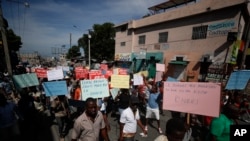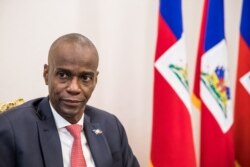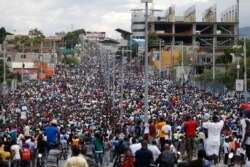The U.S. Embassy in Port-au-Prince issued a statement late Thursday on Haiti's acute political and economic crisis, urging stakeholders to start discussing ways to resolve the issues that have paralyzed the nation.
"The United States continues to urge all of Haiti's political, economic and civil society stakeholders to enter without delay or preconditions, an inclusive dialogue to identify and pursue a path to form a functioning government that will serve the Haitian people," the statement said.
The statement, issued in English, French and Creole, was not signed by Ambassador Michele Sison. It is addressed to the nation's leaders — President Jovenel Moise and the opposition — encouraging them to "work together toward a peaceful and democratic solution now, with an increased sense of urgency."
This is not the first time the U.S. has urged national dialogue as a means to end the political stalemate. Sison and members of the Core Group, which also includes ambassadors from France, Spain, Canada, Brazil, the EU, the U.N. and a representative of the OAS, issued a similar statement in September.
Haiti has been at a standstill for 16 months due to protests sparked by a recurring fuel shortage, corruption allegations against the president and his cabinet members, double-digit inflation and crime.
Weekly protests are growing nationwide, with members of the religious, education and entertainment communities — and even some in the business sector — adding their voices to the call for the president to resign.
Moise has responded to international pressure to start a dialogue, making repeated attempts to organize a national discussion. He recently formed a presidential commission comprised of respected former political leaders to try to make it happen, but the effort failed due to what some say is the opposition's unwillingness to participate and some members' disagreement with the president's actions.
In an interview with AFP this week, Moise said he is not "attached to power" but rather "attached to reforms because this country has been suffering for decades." He also conceded that the people are "exasperated" by the untenable situation.
The U.S. statement also acknowledged people's pleas for change — a criticism often repeated by protesters who target the U.S. and Core Group, saying the United States isn't listening to the demands of the people.
"The Haitian people are suffering; we stand with those Haitians who value peace while courageously calling for accountability," the statement said.
Reacting to the news on local radio, ruling party Deputy Alfredo Antoine, who represents Kenscoff, an agricultural community, applauded the U.S. statement.
"I've been saying this for three months, inter-Haitian dialogue is the only way to resolve the crisis," Antoine said in an interview on local radio.
"People think they can rule without the international community but that is not so," Antoine said. "A person cannot rule alone."
Reginald Boulos, millionaire businessman and leader of the opposition party Mouvman Twazyem Vwa (Third Voice), said he thinks the statement was meant for Moise.
"Reading between the lines, it's a message to Jovnel [Moise] rather than to us," he said. "When they talk about corruption, etc., they are addressing the president, not us."
Boulos said he thinks the national dialogue idea is a good one, but the president should not participate.
"We cannot import a foreign solution to this problem — this will not resolve our problems," Boulos said. "Since 1986, we have been implementing temporary solutions. We [Twazyem Vwa] are in favor of a Haitian solution which excludes Jovenel. He can participate as a citizen, but not as president."
U.S. politicians
Former U.S. Vice President and current Democratic presidential candidate Joe Biden also weighed in this week on Haiti's crisis on Twitter.
"The Trump administration is abandoning the Haitian people, while the country's political crisis is paralyzing that nation," Biden tweeted.
In a subsequent tweet, he advocated for dialogue, adding that a stable, prosperous Haiti is important to the U.S.
"As president, I would press for dialogue to prevent further violence and instability. Investing in Haiti's prosperity and security is in the national security interest of the United States," Biden said.
But U.S. Republican Senator Marco Rubio, who represents a Florida district with a large Haitian-American constituency, said the U.S. should not interfere.
"My interest in Haiti has always been that it has democracy and elections and rule of law and I will continue to support it in those endeavors. Who they choose as their leader is up to the processes that they run internally," Rubio told the Miami Herald. "We don't have a role to play in who resigns and who stays on."
Opposition leaders
Haitian Opposition leader Andre Michel of the Democratic Popular Sector party agrees that the international community should not tell Haiti what to do.
"The international community has no right to continue supporting a president the people of Haiti reject," Michel told VOA Creole this week.
Opposition Senator Antonio Cheramy went further, saying Haiti needs to rethink its relationship with its so-called "friends."
"We must change our relationship with countries who claim to be our friends," Cheramy told VOA Creole. "We need friends who are honest, who are sincere. We need friends who know that we are adults and who do not try to use their friendship to twist our arms."
'Jovenel is the problem'
Most protesters interviewed by VOA Creole did not support the notion that a dialogue would resolve the nation's issues.
"Dialogue cannot resolve the country's problems because Jovenel is the problem," a protester who supports the Lavalas party of former President Jean-Bertrand Aristide told VOA Creole. "We the people don't have a problem with anyone except Jovenel Moise, who is incapable of running the country, so we are asking Jovenel Moise to step down."
Meanwhile, anti-corruption protesters, opposition leaders and the entertainment sector are planning a new series of protests starting Oct. 27, to continue demanding that the president resign.
Matiado Vilme and Renan Toussaint in Port-au-Prince contributed to this report.


